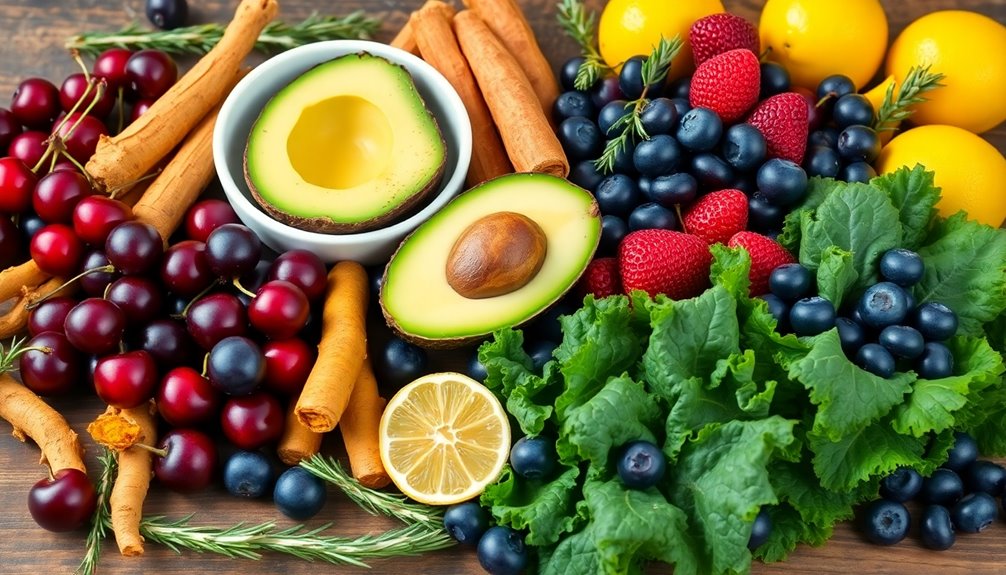If you want to reduce inflammation and boost your health, start incorporating these top 10 anti-inflammatory foods into your diet. Include fatty fish like salmon and mackerel, which are rich in omega-3s. Add leafy greens and berries for their antioxidants. Nuts and seeds also provide healthy fats and vitamin E. Don't forget olive oil, garlic, and ginger, known for their powerful anti-inflammatory properties. Tomatoes are great for antioxidants, while dark chocolate (at least 70% cocoa) offers mood and brain benefits. Explore these foods further for delicious ways to enhance your meals and improve your wellbeing.
Key Takeaways
- Fatty fish like salmon and mackerel provide omega-3 fatty acids that reduce inflammation and support heart and brain health.
- Leafy greens such as spinach and kale are rich in antioxidants and vitamins that help lower chronic disease risk.
- Berries, especially blueberries and strawberries, combat oxidative stress and reduce inflammation markers due to their high antioxidant content.
- Olive oil, with its monounsaturated fats and antioxidants, effectively reduces inflammation when used in cooking and dressings.
- Turmeric contains curcumin, known for its powerful anti-inflammatory properties, making it beneficial for joint health and overall wellness.
Fatty Fish

Fatty fish, such as salmon, mackerel, and sardines, are among the most potent anti-inflammatory foods you can include in your diet. Packed with omega-3 fatty acids, these fish help reduce inflammation, improve heart health, and support brain function. You'll find that incorporating these fish into your meals can be both delicious and beneficial.
When pondering the omega-3 benefits, aim for at least two servings of fatty fish each week. Whether you grill, bake, or sauté, there are countless cooking techniques to make these fish shine in your kitchen.
A simple lemon and herb marinade can enhance the natural flavors, while retaining their nutritional value.
It's also vital to contemplate sustainable sourcing when choosing your fish. Look for certifications like the Marine Stewardship Council (MSC) label, which indicates that the fish comes from responsibly managed fisheries. This guarantees you're not only eating healthily but also supporting the environment.
Another crucial factor is mercury levels. Some fish can contain higher levels of mercury, which can be harmful if consumed in large amounts. Opt for lower-mercury choices like salmon and sardines, and limit your intake of larger fish like shark or swordfish. Additionally, incorporating mindfulness meditation into your routine can enhance your overall well-being, complementing the health benefits of a diet rich in fatty fish.
Leafy Greens

Incorporating leafy greens into your diet is one of the easiest ways to boost your anti-inflammatory intake. These vibrant vegetables, like spinach, kale, and Swiss chard, are packed with vitamins, minerals, and antioxidants that can help combat inflammation. Research shows that diets rich in these greens support overall health and may lower the risk of chronic diseases.
One of the best ways to enjoy leafy greens is by creating nutrient-packed salads. Toss together a variety of greens with colorful veggies, nuts, and a light dressing to create a delicious meal that's both satisfying and beneficial. You'll not only enjoy the flavors but also the health benefits that come from consuming these powerful ingredients.
If you're looking for a quick and easy option, try blending leafy greens into your morning routine with green smoothies. Just throw a handful of spinach or kale into your blender, add some fruit, yogurt, or nut milk, and you've got a tasty drink that's loaded with nutrients. This is a fantastic way to start your day with a boost in energy and inflammation-fighting properties. Additionally, incorporating these greens into your smoothies can provide a balanced mix of nutrients that supports weight loss and muscle recovery.
Berries

Leafy greens lay a solid foundation for an anti-inflammatory diet, but adding berries can elevate your nutritional game even further. These small, vibrant fruits aren't just delicious; they pack a powerful punch of nutrients that can greatly benefit your health. Berries, like blueberries, strawberries, and raspberries, are rich in antioxidants, which help combat oxidative stress in your body—a key factor in inflammation.
The berry benefits extend beyond just their antioxidant power. Studies have shown that regular consumption of berries can lower markers of inflammation, making them an ideal addition to your meals. For instance, blueberries contain anthocyanins, a type of flavonoid that gives them their deep color and has been linked to reduced inflammation and improved heart health.
Similarly, strawberries are loaded with vitamin C and other phytochemicals that contribute to their anti-inflammatory effects. Additionally, incorporating specific exercises for lateral and medial elbow pain can further support overall joint health, reducing discomfort associated with inflammation.
Incorporating berries into your diet is practical and easy. Toss them into your morning yogurt, blend them into smoothies, or sprinkle them on salads for a revitalizing twist. Plus, they're perfect for snacking on their own. By making berries a staple in your diet, you're not only satisfying your sweet tooth but also taking proactive steps toward reducing inflammation.
Nuts and Seeds
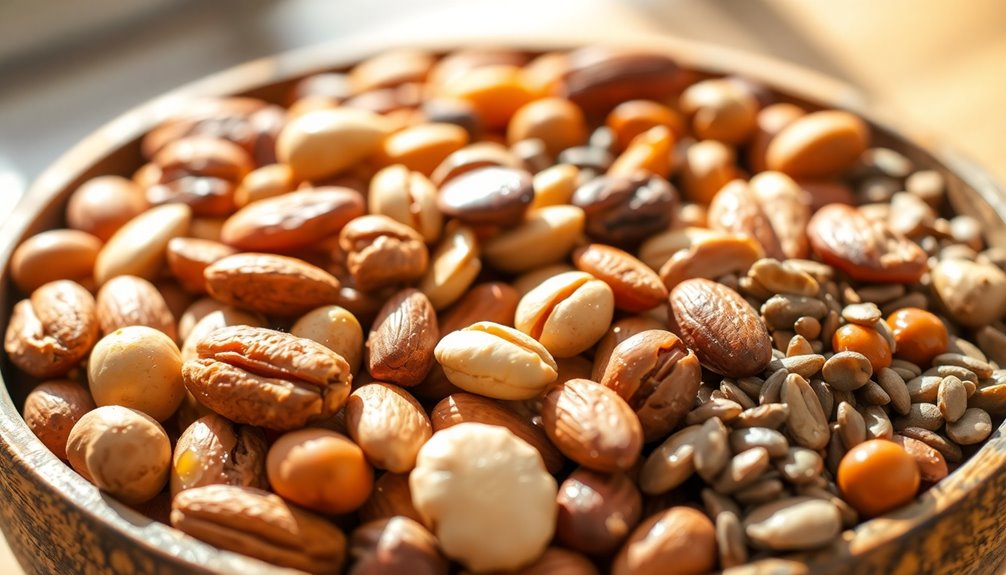
Nuts and seeds are powerhouses of nutrition that can greatly enhance your anti-inflammatory diet. They're packed with healthy fats, fiber, and essential vitamins and minerals that help combat inflammation. Incorporating a variety of these foods into your meals can offer significant health benefits while making your diet more enjoyable.
Consider adding these options to your routine:
- Walnuts: Rich in omega-3 fatty acids, they help reduce inflammatory markers in the body.
- Chia Seeds: These tiny seeds are loaded with antioxidants and can help lower cholesterol levels.
- Almonds: High in vitamin E, almonds support immune function and may reduce inflammation.
If you have nut allergies, don't fret! There are plenty of seed varieties available, such as pumpkin seeds and sunflower seeds, that can provide similar health benefits without the risk of allergic reactions. Recent studies from Emory University School of Medicine(https://www.emory.edu) have shown that incorporating nuts and seeds into your diet can significantly improve insulin sensitivity.
Remember to consume nuts and seeds in moderation, as they're calorie-dense. Aim for a small handful of nuts or a couple of tablespoons of seeds daily. As you explore different options, you'll not only nourish your body but also find new flavors and textures to enjoy.
Olive Oil
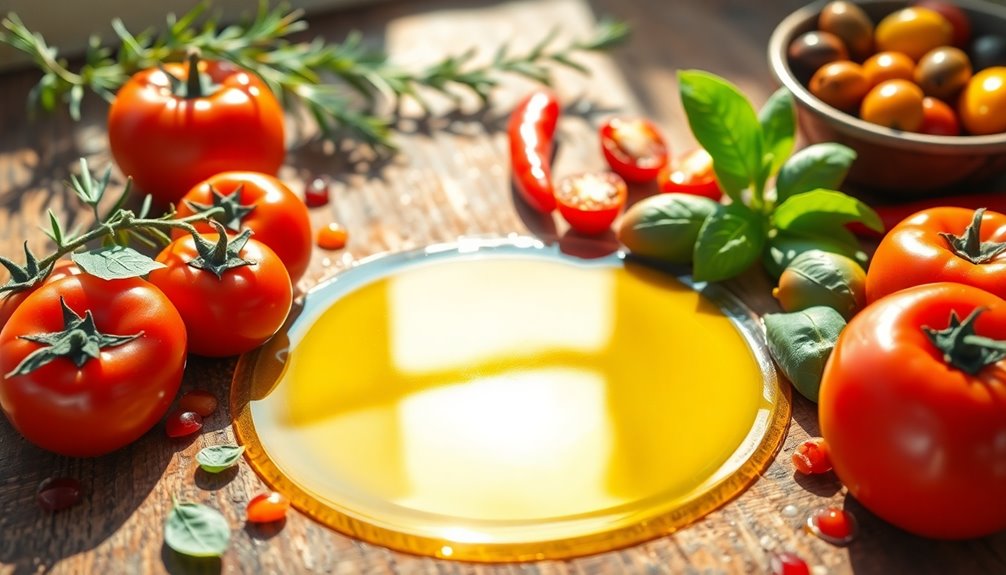
Rich in healthy monounsaturated fats and antioxidants, olive oil stands out as a cornerstone of an anti-inflammatory diet. Its health benefits are backed by numerous studies, which show that the regular consumption of olive oil can reduce markers of inflammation in the body. This is particularly important for individuals looking to manage chronic conditions or simply enhance their overall health.
When you incorporate olive oil into your meals, you're not just adding flavor; you're also nourishing your body. Use it as a base for salad dressings, drizzle it over roasted vegetables, or sauté your favorite greens.
The culinary uses of olive oil are vast, making it easy to integrate into your daily routine. Whether you're preparing a hearty Mediterranean dish or a simple pasta, a splash of high-quality olive oil elevates the taste while providing those essential nutrients.
Extra virgin olive oil is the best choice, as it's the least processed and retains the most antioxidants. Aim to choose cold-pressed varieties to maximize the health benefits. Additionally, incorporating a whole-food plant-based diet can further enhance your overall health and vitality.
Turmeric
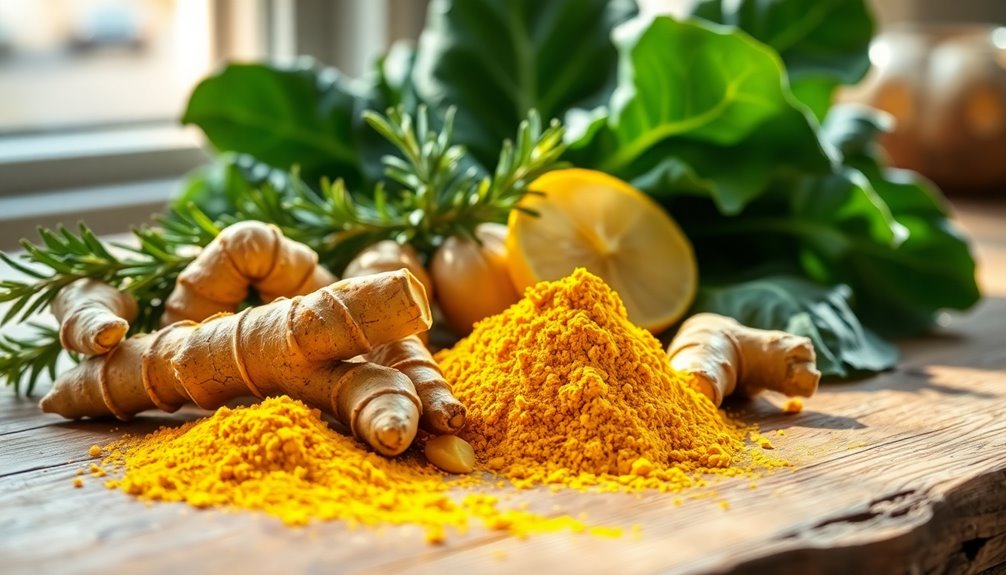
Turmeric, often referred to as the golden spice, boasts a powerful compound called curcumin, which has been extensively studied for its anti-inflammatory properties. If you're looking to enhance your diet with natural anti-inflammatory foods, turmeric should be at the top of your list. The turmeric benefits extend beyond just reducing inflammation; it also promotes overall health and wellness.
Here are a few key benefits of incorporating turmeric into your meals:
- Reduces inflammation: Curcumin effectively decreases markers of inflammation in your body.
- Boosts immunity: Regular consumption can enhance your immune system, helping you fend off illnesses.
- Supports joint health: Turmeric may alleviate symptoms of arthritis and improve joint function.
Adding turmeric to your meals is easier than you think. You can sprinkle it on roasted vegetables, mix it into smoothies, or even brew it in a warm cup of turmeric tea. There are countless turmeric recipes out there, so you can easily find ways to enjoy this spice while reaping its health benefits. Additionally, incorporating turmeric can be especially beneficial for those looking to overcome the effects of alcoholism, as it can support overall well-being during recovery.
When you embrace turmeric, you're not just adding flavor; you're making a conscious choice to support your body's health and well-being.
Garlic
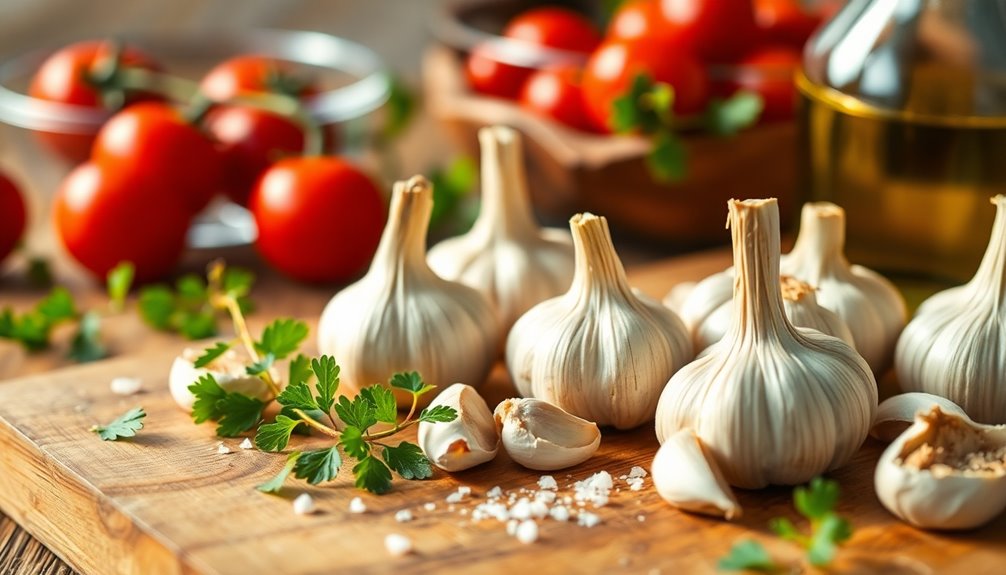
Have you ever wondered how a simple bulb can pack such a powerful punch in your diet? Garlic isn't just a flavorful addition to your meals; it's a nutritional powerhouse packed with incredible garlic benefits. This humble ingredient is known for its anti-inflammatory properties, which can help reduce chronic inflammation—an underlying factor in many health issues.
Research shows that garlic contains allicin, a compound that gives it its distinct flavor and aroma, while also providing numerous health benefits. This compound has been linked to improved heart health, enhanced immune function, and even reduced risk of certain cancers. By incorporating garlic into your daily meals, you're not just boosting flavor; you're also supporting your body's natural defenses.
Interestingly, reducing chronic inflammation through dietary choices can also be a key factor in managing the risks associated with traditional bread consumption. Trying out some delicious garlic recipes is an easy way to enjoy these benefits. You can roast garlic to bring out its sweetness and spread it on whole-grain toast, or add minced garlic to stir-fries for an extra kick.
Don't forget to include it in homemade salad dressings or marinades—these simple tweaks can elevate your dishes while promoting your health.
Whether you're a seasoned chef or a kitchen novice, garlic is versatile and easy to work with. So, why not embrace this culinary gem? By adding more garlic to your diet, you're not only enhancing your meals but also taking a step towards better health and well-being. It's a small change that can make a big difference in your life.
Ginger
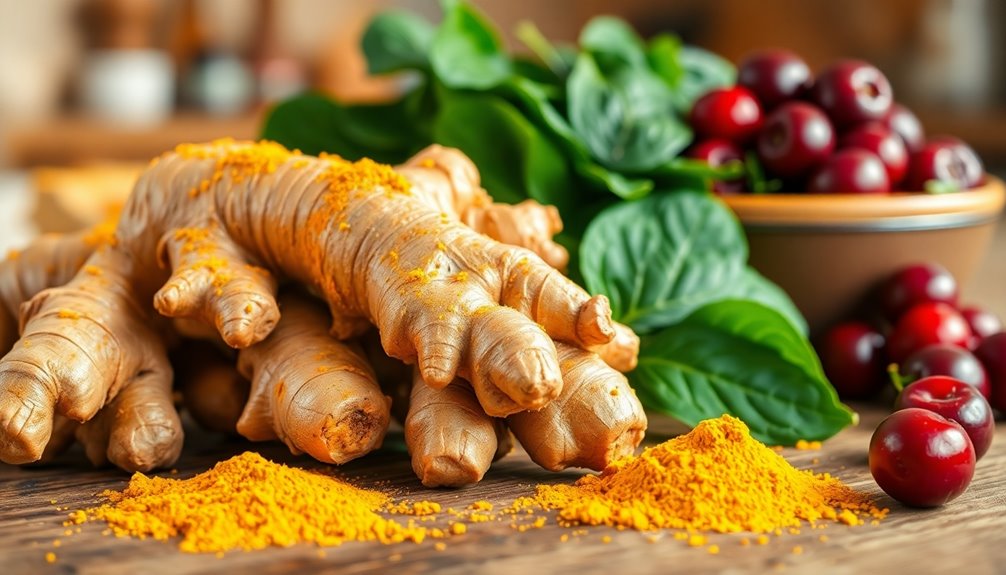
Garlic may be a staple in your kitchen, but ginger deserves a spot on your grocery list too. This powerful root is renowned for its anti-inflammatory properties, making it a fantastic addition to your diet. Whether you're sipping on warm ginger tea or experimenting with flavorful ginger recipes, you're not just treating your taste buds; you're also supporting your overall health. Research suggests that incorporating ginger into your diet can help mitigate some of the health risks associated with snoring and sleep apnea, further promoting better sleep quality.
Incorporating ginger into your meals can be incredibly easy and rewarding. Here are a few simple ways to enjoy it:
- Ginger tea: Steep fresh ginger slices in hot water for a soothing drink that aids digestion and reduces inflammation.
- Smoothies: Blend ginger with your favorite fruits and greens for a revitalizing, health-boosting smoothie.
- Stir-fries: Add grated ginger to your stir-fried vegetables for an extra kick and a wealth of nutrients.
Research indicates that ginger can help lower markers of inflammation in the body, making it a valuable ally against chronic diseases. Plus, its unique flavor can enhance a variety of dishes, from savory to sweet.
Tomatoes

Tomatoes are a vibrant and versatile addition to your diet, packed with nutrients that can help combat inflammation. Rich in antioxidants like lycopene, tomatoes may reduce the risk of chronic diseases by fighting oxidative stress. Their bright red color indicates high levels of this powerful antioxidant, which has been linked to lower rates of heart disease and certain cancers.
When you incorporate tomatoes into your meals, explore the various tomato varieties available. From sweet cherry tomatoes to hearty beefsteaks, each type offers unique flavors and textures that can enhance your dishes. Seasonal availability is another aspect to take into account; fresh tomatoes are typically at their peak during summer, providing the best taste and nutritional value.
To reap the tomato health benefits, try adding raw tomatoes to salads or sandwiches, or roasting them to bring out their natural sweetness. Cooking tomatoes can actually increase the bioavailability of lycopene, so don't hesitate to include them in sauces and soups. Additionally, drinking water from SlimCrystal bottles can further enhance your energy levels, complementing the anti-inflammatory benefits of tomatoes.
Here are a few cooking tips: combine tomatoes with healthy fats like olive oil to improve nutrient absorption, and experiment with herbs like basil or oregano to elevate flavor and health benefits. By making tomatoes a regular part of your meals, you'll not only enjoy their delicious taste but also nourish your body and support your journey toward better health. So, go ahead and add this anti-inflammatory powerhouse to your grocery list!
Dark Chocolate

In addition to the benefits of tomatoes, dark chocolate emerges as another delightful option for those seeking anti-inflammatory foods. Packed with antioxidants, dark chocolate can play a significant role in reducing inflammation and improving overall health. The key lies in choosing chocolate that contains at least 70% cocoa to reap the most health benefits.
Here's how dark chocolate can enhance your diet:
- Rich in Flavonoids: These compounds help reduce inflammation and promote heart health.
- Improves Mood: Dark chocolate stimulates the production of endorphins, boosting your mood and overall well-being.
- Supports Brain Function: The antioxidants in dark chocolate may enhance cognitive function and memory.
Incorporating dark chocolate into your diet isn't just healthy; it's also delicious! You can enjoy it in various ways, from nibbling on chocolate-covered almonds to indulging in rich, dark chocolate desserts. There are countless delicious recipes to explore that feature dark chocolate, such as brownies, chocolate mousse, or even adding it to smoothies for a healthful twist. Additionally, the antioxidants in dark chocolate may complement other natural supplements that support overall wellness.
Just remember, moderation is key. A small portion can provide you with those incredible health benefits without overloading on sugar. So go ahead, treat yourself to a piece of dark chocolate and relish the flavors while knowing you're making a positive choice for your health. Embrace this scrumptious option and feel good about adding it to your anti-inflammatory food arsenal!
Frequently Asked Questions
How Can I Incorporate These Foods Into My Daily Meals?
To incorporate these foods into your daily meals, start by meal planning for the week. Include recipe ideas like a quinoa salad with leafy greens, cherry tomatoes, and olive oil.
For breakfast, try oatmeal topped with berries and nuts. You can also add turmeric to soups and smoothies.
Snack on raw veggies with hummus or make a stir-fry with your favorite vegetables. These simple swaps can make a big difference in your diet!
Are There Any Foods to Avoid for Inflammation?
Ever wondered what might be fueling your inflammation? To prevent it, steer clear of inflammatory triggers like refined sugars, processed foods, and trans fats. These can worsen inflammation and lead to chronic health issues.
Instead, focus on whole foods and balanced meals. By avoiding these culprits, you'll not only support your body but also foster a sense of belonging within a community that values health and wellness.
Your choices can make a difference!
What Is the Recommended Serving Size for These Foods?
When considering portion sizes for anti-inflammatory foods, aim for balance in your meal planning. Generally, a serving of vegetables is about one cup, while fruit servings are typically one medium piece or half a cup. For nuts and seeds, about a small handful is ideal. Fish portions should be around three ounces. By sticking to these guidelines, you'll create nutritious meals that support your health and make you feel great.
Can These Foods Help With Chronic Conditions?
Imagine your body as a battleground, where chronic pain and autoimmune diseases wage war. By incorporating anti-inflammatory foods into your diet, you can bolster your defenses. These foods, rich in antioxidants and healthy fats, may help reduce inflammation, offering you some relief.
While they're not a cure-all, they can play a supportive role in managing symptoms. You deserve to feel better, and these foods could be a valuable ally on your journey.
How Long Does It Take to See Results From Eating These Foods?
When you begin integrating anti-inflammatory foods into your diet, you might notice some changes within a few weeks. However, measuring progress can vary based on individual health conditions and lifestyle.
It's crucial to be patient and adjust your expectations, as some people may experience results sooner than others. Consistency is key; stick with it, and allow your body the time it needs to show you the benefits of these dietary changes.
Conclusion
Incorporating these top anti-inflammatory foods into your diet might seem like a challenge, but isn't it ironic how the simplest choices can lead to a healthier life? Imagine swapping that greasy snack for a handful of nuts or a piece of dark chocolate—who knew eating better could actually taste good? By embracing these delicious options, you're not just fighting inflammation; you're also treating yourself. So go ahead, indulge in your health—it's the best kind of self-care.

